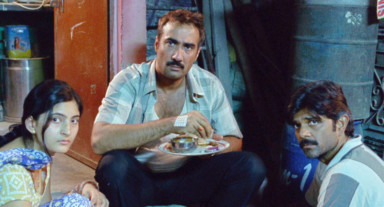
The hammer is the favourite weapon of aggression among the characters who form the immensely unlikeable family in Titli.
They use the hammer to smash faces and in one sequence to even smash the hand of a loved one.
But it’s the hammering of the individual’s self-esteem that Titli hits you the hardest with. Titli, played by newcomer Shashank Arora, the youngest of three brothers from a low-life Delhi family of car-jacking criminals, takes his newly-wedded wife to her lover, watches them disappear into the bedroom and sits quietly waiting for the couple to finish their business.
It’s a moment where the silence of helplessness pierces the irony of the plot.
This is not your martyr husband Ajay Devgn from Sanjay Leeela Bhansali’s Hum Dil De Chuke Sanam leading his reluctant bride back to her beloved. This is a world stripped of sublimity and grace, of cold-blooded calculations where emotions are invested only on the assurance of financial benefits.
Trapped in this world of crime is Titli (Arora, a natural find) who is desperate to escape his family’s filthy life, even if it means cutting a deal with his wife to let her sleep with her lover. I can’t get Arora’s look of a haunted animal out of my mind.
Titli is one of those heist thrillers where the characters never appear cool in their lawless behaviour. Not for a moment does the casual, almost preponderant violence, appear gratuitous, let alone appealing.
The violence of Titli made my stomach churn. It’s in the way the grimy male characters clear their throats every morning or the way they slap and sleep with their women. It was in the squalid environment and in the hearts of the characters that the plot finds its centrality.
The script, written by director Kanu Behl and Sharat Katriya (the director of Dum Laga Ke Haisha, that other, far lighter, film about heavyweight problems), shows us the cruel misdeeds of a family for whom crime is a way of life. Their actions may shock us. For them it’s just another day of hard work.
Beyond all its outstanding merits (including a near-absence of background music, which imbues a docu-grittiness to the brutal goings-on) is the film’s absolute denial of a moral code for its principal characters. This is The Godfather without the Sicilian bravura.
In this family of criminals, the conscience is an unwanted intruder. Yet, it does strike at the end. Our ‘hero’ Titli finds a shuddering redemption. But I remained unconvinced. You can take the Titlis of the metropolis out of crime, but can you really take the crime out of such characters?
Titli left me too stunned to move. Numbed with shock and disbelief, Titli mirrors the reality of Delhi with a blunt brutality that leaves you shocked. This is the story of a criminal family in a crowded locality of Delhi where ambitions are smothered in the stench of decaying dreams.
I am getting lyrical over a film that scoffs at all lyricism. The language is so violent that I often found myself turning away, not in disgust, but terror, and fear of a life that we don’t talk about. Not in our everyday conversations. Not even in our movies.
Dare I say Titli is cinema at its rawest? Other than Ranveer Shorey, who is absolutely first-rate as the eldest of the three siblings, there are no known faces in the cast. That’s a masterstroke, I don’t think the film would have worked so effectively if Bollywood’s recognisable faces had walked into Behl’s tightly-wound underbelly of Delhi where everything is about survival, love, loyalty, family values and conscience.
It would be insulting to congratulate the actors. Because they are not. They are people who have experienced life at its most basic, have known hunger, shame and deprivation and desperation, who feel real emotions and have probably lived some of the murky situations that the plot forces them to explore.
A word about the absolutely technique-less technique applied to the film. No fancy framing of the shots, none of characters caught in the ‘right’ light. It all unfolds as though Siddharth Dhawan’s camera doesn’t exist and Namrata Rao’s editing was done so quietly the characters didn’t even know portions of their lives had gone missing.
Interestingly the soundtrack includes a lot of bhajans (devotional songs) playing in the background to provide an ironic subtext to the immoral lives led by the characters.
An absolutely unforgettable film.









